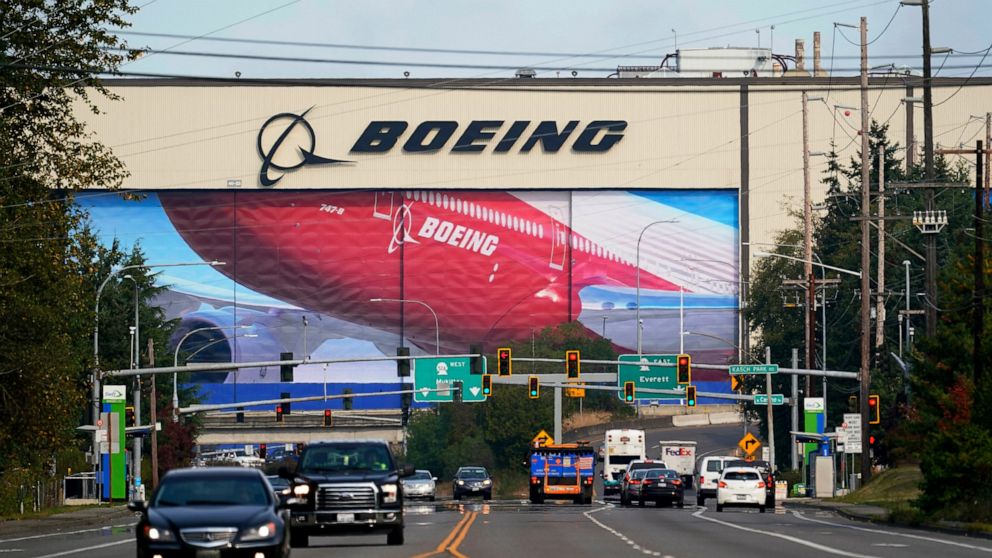EU moves ahead with tariffs on US but hopes for Biden change
The European Union is pressing ahead with plans to impose tariffs and other penalties on up to $4 billion worth of U.S. goods and services over illegal American support for plane maker Boeing
BRUSSELS — The European Union pressed ahead Monday with plans to impose tariffs and other penalties on up to $4 billion worth of U.S. goods and services over illegal American support for plane maker Boeing, but expressed hope that trade ties would improve once President Donald Trump leaves office.
EU trade ministers were discussing the move on a videoconference after international arbitrators last month gave the EU, the world’s biggest trade bloc, the green light to do so.
A year ago, the World Trade Organization authorized the United States to slap penalties on EU goods worth up to $7.5 billion – including Gouda cheese, single-malt whiskey and French wine – over European support for Boeing rival Airbus.
After Trump also imposed tariffs on EU steel and aluminum and threatened punitive duties on cars, the Europeans had hoped that he would hold fire on the tariffs related to the Airbus-Boeing dispute. But having repeatedly failed to achieve a negotiated solution, the EU is now ready to announce punishment of its own.
“The U.S. has imposed their tariffs following the WTO ruling in (the) Airbus case. Now we have a WTO ruling also in Boeing, allowing us to impose our tariffs, and that’s what we are doing,” EU Commission Executive Vice-President Valdis Dombrovskis told reporters.
“Of course, we remain open for a negotiated solution. Our proposal remains on the table that both sides withdraw their tariffs,” Dombrovskis said, but he noted that despite several appeals, “so far, the U.S. has not agreed to withdraw their tariffs.”
The Europeans are hopeful that Trump’s hardline trade stance will soften when president-elect Joe Biden takes office in January. Dombrovskis welcomed Biden’s commitment to international alliances, the multilateral system and to improving ties with the EU.
German Economy Minister Peter Altmaier, whose country holds the EU’s rotating presidency, said the bloc has “great expectations” and “hope that the U.S. presidential election will also be linked to a return to multilateral approaches to international trade, and that it will be possible to overcome past conflicts.”
In terms of tariffs over Boeing, the EU had released a preliminary list that suggests it could go after a wide range of U.S. products including frozen fish and shellfish, dried fruit, tobacco, rum and vodka, handbags, motorcycle parts and tractors.
The president of the U.S. Distilled Spirits Council, Chris Swonger, said that new tariffs “will be a major blow” to the spirits industry, “especially craft distillers who are struggling to regain their footing following the closings of distillery tasting rooms, restaurants and bars due to COVID-19.” Whiskey exports to the EU have already declined by 41% due to the bloc’s retaliation over Trump’s tariffs on steel and aluminum in 2018.
Just before the Nov. 3 U.S. presidential election, Airbus CEO Guillaume Faury told The Associated Press that his company is “very happy” with the WTO ruling. He lamented the long-running dispute and that “these stories across the Atlantic are really a lose-lose for everyone.”
The Europeans remain reluctant to ramp up trade tensions as the coronavirus pandemic ravages economies around the world.
Some 16 million workers on both sides have jobs that supported by trans-Atlantic trade, the biggest such relationship in the global economy. Even before the pandemic hit, tit-for-tat tariffs over the past four years have affected companies and people making and selling a whole host of goods.
Boeing itself said last month that it will cut 7,000 more jobs as the virus smothers demand for new aircraft and pushed it to a loss.
Peter Chase, senior fellow at the German Marshall Fund think-tank, says the Europeans should hold fire.
“They don’t need to do this now. They don’t need to disrupt trade,” Chase said. Biden “is going to have a lot of constraints and he’s going to have to work first on the domestic issues, both the COVID crisis and the economy. And he’s going to have to do a lot of internal healing. And I think that they should cut him some slack, basically.”
———
Mark Carlson in Brussels, Angela Charlton in Paris and Dorothee Thiesing in Berlin contributed to this report.
![]()


